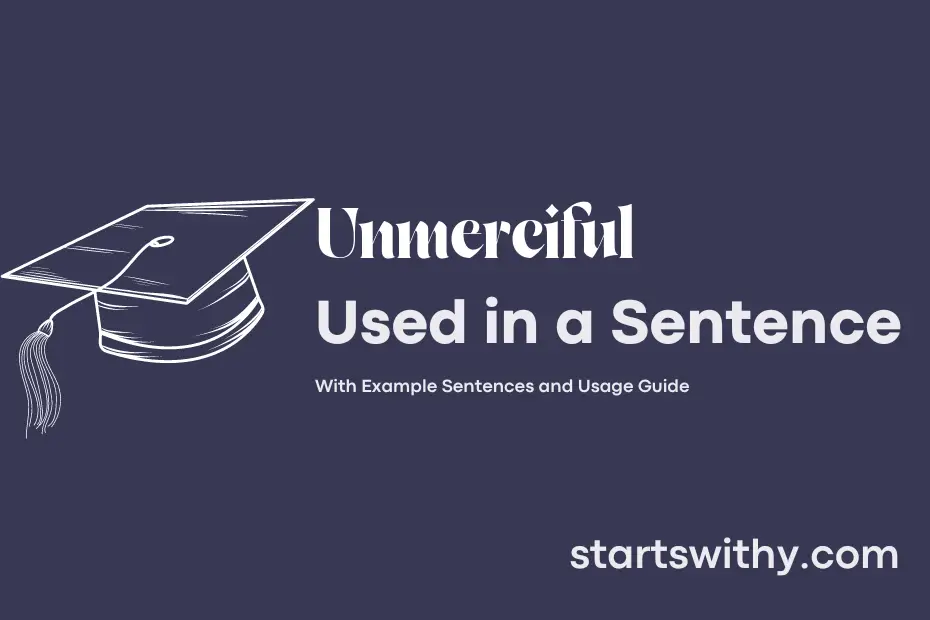Have you ever struggled to find the right words to describe something that is unbearably harsh or severe? This is where the term “unmerciful” comes into play. In simpler terms, when something is described as unmerciful, it shows a lack of compassion or mercy towards others.
In essence, when an action or situation is labeled as unmerciful, it signifies a level of cruelty or harshness that is relentless and unforgiving. This word captures the essence of a severe and unwavering lack of mercy.
7 Examples Of Unmerciful Used In a Sentence For Kids
- The storm was unmerciful with its strong winds.
- The lion roared unmercifully in the jungle.
- The teacher’s glare was unmerciful when the students were misbehaving.
- The dragon’s breath was unmerciful as it scorched the village.
- The bully’s words were unmerciful as they hurt the other kids.
- The sun was shining unmercifully on the hot summer day.
- The punishment was unmerciful for breaking the rules.
14 Sentences with Unmerciful Examples
- Unmerciful deadlines for assignments are common in college, causing students to stay up late working on projects.
- The professor was known for his unmerciful grading, often giving harsh feedback on papers.
- The workload during exam week was unmerciful, leading to high stress levels among students.
- Group projects can be unmerciful when trying to coordinate schedules and responsibilities.
- The competition for internships in the tech industry is unmerciful, with hundreds of students vying for limited positions.
- The campus bookstore’s prices for textbooks are unmerciful, making it difficult for students to afford all the required materials.
- The cafeteria’s food prices were unmerciful, forcing students to opt for cheaper off-campus options.
- The professor’s expectations for class participation were unmerciful, making it challenging for shy students to speak up.
- The assignment’s word count requirements were unmerciful, leading students to frantically try to meet the criteria.
- The penalties for late submissions were unmerciful, causing students to fear missing deadlines.
- The professor’s quiz questions were unmerciful, covering obscure details that many students struggled to recall.
- The schedule for final exams was unmerciful, with multiple tests crammed into a short period of time.
- The library’s hours during exam season were unmerciful, leaving students with limited time to study.
- The cost of living in a college town can be unmerciful, especially for students on a tight budget.
How To Use Unmerciful in Sentences?
To use Unmerciful correctly in a sentence, first, identify a situation or scenario where someone is being extremely harsh or unforgiving. For example, “The teacher was unmerciful in her grading of the final exams, giving out mostly failing grades.”
Next, place the word Unmerciful appropriately in the sentence. It is commonly used as an adjective before a noun to describe someone’s actions or behaviors. For instance, “Her unmerciful criticism caused many students to feel discouraged.”
Remember that Unmerciful conveys a sense of extreme severity or cruelty, so it is important to use it in contexts where this meaning is appropriate. Avoid using it in situations where a milder word like “strict” or “demanding” would be more suitable.
Lastly, read your sentence aloud to ensure that it flows smoothly and accurately conveys the intended meaning. If needed, you can also consult a dictionary or thesaurus to confirm that Unmerciful is the most fitting word for your sentence.
With practice, you will become more comfortable incorporating Unmerciful into your writing and conversations, making your language more varied and expressive.
Conclusion
In literature and everyday language, sentences with the word “unmerciful” often convey a sense of harshness, severity, or a lack of compassion. These sentences imply a merciless or unforgiving attitude towards a person or situation, showcasing a stark judgment or unforgiving nature.
Overall, sentences with “unmerciful” serve as vivid reminders of the impact of cruelty, callousness, or relentless behavior. They underscore the importance of empathy, kindness, and understanding in human interactions, urging us to be mindful of our words and actions to avoid inflicting unnecessary pain or hardship on others.



